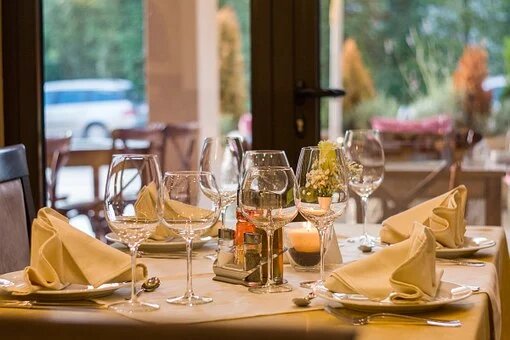
The Luncheon by W. Somerset Maugham is a humorous short story written in the first-person narrative. The piece is filled with ironic situations and witty dialogues, and the panic and stress of the narrator’s perspective makes it all the more amusing and relatable. The Luncheon is written mostly in past tense– it starts in the present-tense when the narrator runs into a lady he’d met twenty years ago. After this, a majority of the story is in the form of the narrator’s flashback to their first meeting- a very fascinating encounter. What is interesting is that Maugham delivers his clever one-liner at the very end of the story, right after the flashback. The memory builds the humour and mood of the reader, while the concluding line presents anabrupt yet smooth and memorable ending. The main themes of this story are pride, humorous shamelessness, and the contrast of expectations and reality. Maugham employs repeated dialogues to emphasize the irony, and the chronological order of the restaurant scene is one of the highlights in building the narrator’s anxiousness.
The Luncheon | Summary
The story begins in the present time when the narrator catches sight of a lady in a theatre- a lady whom he met in the past, but it had been so long that he would not have recognized her if someone did not mention her name. He then thinks back to the first time they met- it was twenty years ago in Paris. The narrator was barely making ends meet, and the lady- about forty years old at the time- had called him to speak about a book of his that she had recently read. She then asked if they could meet over luncheon for a chat, as she was passing through Paris soon. She suggested a restaurant called Foyot’s, which is far above the narrator’s financial capacity. But he was too flattered at the invitation from a woman, and hence he calculated his savings and planned how he should live the next few weeks to be able to spend for lunch at Foyot’s.
The woman was older and more imposing than the narrator expected. The narrator was prepared to listen to her words, though, as she was going to speak about him. The menu arrived, and everything was more expensive than the narrator thought. Luckily, the lady said she barely eats anything at Luncheon- she thinks people eat too much these days, and she only eats one single thing. She requests just a small fish or a salmon. The narrator became nervous- salmon was very expensive, and it wasn’t even on the menu. Nonetheless, he ordered it for her. However, in the waiting time, the waiter asked them whether they would like to order something till their salmon came. The lady replied no, for she never eats more than one thing- unless it’s a little caviar. The narrator’s heart sank, for caviar is expensive as well- so he ordered it for her, but only got the cheapest item on the menu for himself: Mutton chops.
She was disdainful of his order, telling him it was unwise to eat heavy meat for lunch– how would he do work? Then came the question of drinks. He told her he never had drinks with luncheon, to which she agreed- before adding that her doctor does not let her drink anything but champagne, which is extremely expensive. The narrator paled and ordered half a bottle, getting water for himself. As the lady ate her salmon and caviar, she chatted happily about art, music and literature- but all the narrator could think of was whether he would be able to afford the bill. When his mutton chops arrived, the lady suggested that he follow her example by eating just one thing, rather than eating so heavily, which spikes his annoyance.
Finally, the waiter came back with the menu, asking if there was anything else. The lady waved him off, saying she only eats one single thing at Luncheon. But it would be a shame to leave Paris without having some asparagus. The narrator was horrified, but he still managed to ask the waiter, hoping the answer would be no. Unfortunately for him, the waiter said it was indeed in stock, and so the narrator asked the lady whether she wanted it. She replied saying that she never ate much for luncheon, but if he insisted, she would have some asparagus. As they waited for their order, the narrator felt panicked- he had no idea how much money he had left. He tried to form a plan for what he would do if he could not procure the money to pay off the meal.
The asparagus arrived with a tantalizing smell, and the narrator pretended not to be tempted as the woman ate them all. As she finished, he offered her a coffee- to which she smoothly added an ice cream, as well. The narrator knew by now that it was all the same. He had to spend far more than he predicted, either way. So he ordered what she asked, and she told him as she ate her ice cream that one should always get up from the table feeling like they could eat more. He asked her hesitatingly if she was still hungry- and she said shamelessly that she never eats at luncheon, she was talking about the narrator! Just as they were about to leave, a terrible thing happened- the head waiter came to see them bearing a basket of peaches. Peaches were not in season, which means they would be all the more expensive.
The lady took a peach nonchalantly, telling the narrator not to have one himself. She told him that he’d eaten heavy meat for lunch, hence would have no space. Meanwhile, she didn’t eat much at all, just enough for a snack- therefore, she could have a peach. The bill was extremely high, and the narrator only had enough money left for an inadequate tip- three francs. The woman side-eyed him, assuming that he was mean-spirited for his low tip, but all he could think was that he was broke for the rest of the month. The woman told him to follow her lead from then on- like her, never eat more than one thing at luncheon. When he replied dryly that he would do better by not having dinner, either, she praised his humour and hopped into a cab, leaving.
Now, back in present time at the theatre, the narrator thinks he has finally had his revenge for that irritable incident- for the woman is almost unrecognizable, now weighing twenty-one stone.
The Luncheon | Analysis
The Luncheon is a thoroughly engaging storIn the beginning, the narrator mentions bumping into a lady at the theatre whom he had met twenty years ago in Paris. He says, “if someone had not mentioned her name I do not think
I would have recognized her.” Though we do not know as we begin reading, this is actually a subtle foreshadowing of the last line of the story- Maugham’s witty twist. What we may also note from their brief present-tense interaction (which will come to our realization after reading the flashback) is that the lady’s rather shameless nature has not changed one bit. She says, “Do you remember the first time I saw you? You asked me to luncheon.” Here, she makes it seem as though the entire outing was the narrator’s suggestion when in reality, she had been the one to not only call him but also suggest the restaurant. From this, we can understand the context of her character- rather airy, slightly self-centered, but almost unknowingly so.
To start, let us define a luncheon- it is simply a lunch meal, but a more formal and often more expensive setting. This already establishes a predicament for the narrator- he is living off every last coin, and a luncheon at Foyot’s is quite a deviation from his financial planning. Here, we see the themes of pride, as well as an introduction to expectation versus reality. The narrator was carried away with being invited to lunch by a woman- and more specifically, a woman who wanted to talk about his writing work. This flatters both his personal and professional life, and hence he cannot turn down the offer. On top of the flattery, it is pride that stops him from telling the woman truthfully that he cannot afford such an expensive outing. It is possible that on the phone call, he did not know how old she was or how she looked- she could have been a young, beautiful woman, and so we may assume that the narrator wanted to impress her. He quickly made mental calculations to plan his next few weeks on minimum expenditure.
When the narrator and the woman meet for the first time, we see the theme of expectation and reality. The narrator had expected- or maybe we may even say hoped- for a younger and more attractive woman. But she was around forty, with an imposing appearance. Despite the fact that she was talkative, the narrator said, “since she seemed inclined to talk about me I was prepared to be an attentive listener.” We once again see both pride and expectation. This is a different type of pride than what the narrator displayed earlier- this is more of a natural excitement and pride of one’s own work that comes with hearing others praise one’s efforts. And it is his expectation that that is how the luncheon will go- after all, that is the reason the lady called him to chat in the first place.
We are then introduced to the most recurring phrase of this story, around which the plot is centered: the woman says, “I never eat anything for luncheon. I never eat more than one thing.”
As the story progresses, we see how completely untrue this is- for when the woman says she only eats one thing, it’s almost as if she means one thing off of each section in the menu. And while this would not be a problem otherwise, here she is at the expenditure of someone else. Yet she continues shamelessly ordering the most expensive dishes. Starting with her request for a “small fish” and shocking the narrator with an order for salmon, and then carrying on to caviar, champagne, ice cream and even asparagus and peaches. Each time, she repeats her famous dialogue, “I never eat more than one thing.” which further infuriates the narrator, though he does his best to hide it.
In tandem, we see the narrator attempt to alter his order in accordance to the price of the woman’s. For example, he orders water instead of champagne, and mutton chops as she orders salmon and caviar. At this point, it could be quite usual for the other person to observe the situation and quietly cooperate. But this lady seems to be, for lack of better words, “in her own world.” She has an air of over-confidence, as she tells the narrator that he should follow her lead instead. By advising him against eating lamb chops because of the heavy meat, she shows clearly that she has no grasp of the situation. However, there is a counter possibility (though with her brazen nature, we cannot be quite sure) that she was not able to afford such an elaborate meal herself, and this was her clever way of eating at luncheon under somebody else’s budget. Further, the constant reiterations of eating only one thing could have been the setting of the situation so that one may not question her about her actions. This would still point us in the direction that she assumes the narrator has the money to spend- after all, why else would he accept a meal at Foyot’s.
The constancy at which the ordering of food happens is quite humorous- as soon as the narrator thinks they can wrap up the meal, the waiter turns up or the woman adds on a comment. Especially in the end, when they exit, the head waiter arrives with a basket of peaches, which is a completely unexpected addition and adds to the irony of the plot. We also witness the woman’s strange nature as she tells the narrator not to take a peach, as he had heavy lunch, while she had just a “snack.”
We may also note the different adjectives used to describe the narrator’s reactions from the beginning of the end of the luncheon to see his progressively infuriated state. He starts off nervous, and then “pales” and then wills the order not to be there, before finally letting the woman order whatever she wants in defeat. He says, “it is all the same, anyway” indicating that he’s already lost a great deal of money on the luncheon, so at this point a few more francs would not make a difference. This piling up of frazzled emotions until it all gives way to exhausted acceptance provides an interesting quirk to the story.
It is also fascinating to note that despite the woman’s outlandish nature, we feel more shocked and amused by her than angry. This may be due to her irony and comedic timing with her reiteration of “I never eat more than one thing.” or her complete lack of awareness about the situation around her, which is of such huge extent that it crosses being represented as irritating and becomes amusing. One more witty addition by Maugham is that towards the end of their luncheon, when the narrator scrapes his pockets to pay the bill and hence can only inadequately tip the waiter, the woman notices. It is perplexing and completely ironic that for the entirety of the luncheon, she did not notice the expense of her items or the lack thereof in the narrator’s (including his insistence of not eating several portions) yet the first thing she does pay attention to in her surroundings is the misunderstood tip. Because of the narrator’s constant asking of whether she would like to order more food, she could have also assumed he had the money to do so.
The ending, when the story is brought back to present tense, is where Maugham shows his signature wit- the narrator notes with satisfaction that the woman has received the karma for her actions twenty years ago, for she has gained a great amount of weight. This is also what his comment at the beginning (about her being unrecognizable) foreshadowed. It is important to note that both the woman and the narrator remain unnamed throughout the story. This is possibly done to center the story around their characteristics and dynamics especially. Though we do not know the woman’s or narrator’s name, we can very clearly picture them in our minds. The air of personality written around the character substitutes the single name that we never hear. As is often the case with Maugham, The Luncheon is a brilliant example of a character sketch done right.


